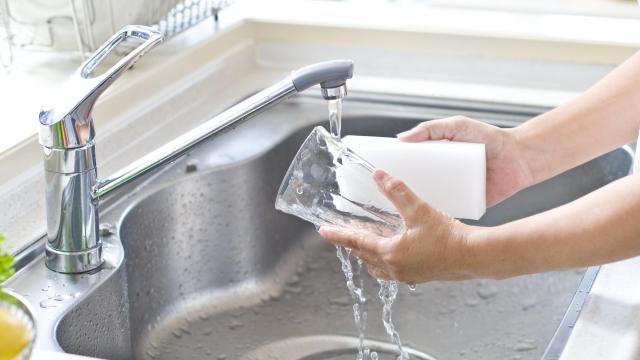In a former life, I was a lab technician in a chemistry lab, where I used a very small portion of the knowledge I had gained studying chemistry for four years. I left that industry over a decade ago, but little habits have stuck with me, particularly when it comes to glassware.
I love chemical glassware. I have an (admittedly terrible) Erlenmeyer flask tattoo on my lower back , and I tend to gravitate towards kitchen equipment that looks like it belongs in a lab. In school, I never minded “doing the dishes,” i.e., splashing around in an acid bath while cleaning the beakers, round-bottoms, and — yes — Erlenmeyers of all the organic and inorganic material that clung to their insides. After a cleansing soak in the acid bath and a neutralising splash in the base bath, I would rinse each piece of glass three times to remove the last bit of residue from the baths.
The three-time rinse was not a personal affectation, but something everyone did, and something I was instructed to do when my fellow undergrad, Trevor, first walked me through the dishwashing process. “Each rinse removes 90% of the residue,” he explained. “By the time you’ve done it three times, you’ve removed 99.9% of it.” That made an impression on me, and I still find myself rinsing things — especially dusty drinking glasses — thrice.
To confirm what Trevor told me 13 years ago, and to nerd out a bit, I went to the Alconox website to see if they had similar advice. (Alconox manufactures industrial cleaning supplies similar to, if not the same as, what we used in my undergrad lab.) I was not disappointed:
“Various college and university glassware washing procedures that call for rinsing three times (triple rinsing). We are also aware of historical documents published by early participants in using detergents to clean laboratory glassware from lab glassware manufacturers that recommend triple rinsing…The logic behind a triple rinse is that in filling and emptying a vessel three times with water, each time you are diluting by 2 orders of magnitude. In theory you may leave 1% of whatever was in the vessel each time you empty it, so a 1:100 dilution with fresh rinse water occurs at each rinse. A triple rinse results in a 6 orders of magnitude reduction of such water soluble residues that might have been present in the dirty wash solution.”
Is this overkill for the glassware in your kitchen? Yes. I doubt you’re working with any reagents or chemicals that pose a threat in residue form, but there are moments when a triple rinse feels a justified, say when rinsing out a wine glass or beer glass. In fact, beer snobs take their glassware cleanliness almost as seriously as chemists. “Beer clean” is a whole thing — a dust-free, residue-free standard that’s meant to ensure you get the best out of your beer. From CraftBeer.com:
“A beer clean glass is free of any impurities: leftover sanitizer, beer, dirt, food, detergent, grease, chap stic [sic], lipstick, lip balm, boogers, or anything else that would provide the escaping CO2 a spot to cling to. These areas of grime act as nucleation sites, allowing bubbles to cling to and collect around the point. Any time you serve a beer in a glass that is not free of impurities you (or your customers) will quickly see the hidden residue that remains on a seemingly clean glass.
…The Brewers Association’s Draught Beer Quality Manual (DBQM) describes a beer clean glass is one that, “forms a proper foam head, allows lacing during consumption and never shows patches of bubbles stuck to the side of the glass in the liquid beer.”
“Bubbles clinging to the inside of a beer glass is the most obvious sign that a glass is not beer clean. I don’t care what is causing those nucleation sites, but I don’t want to be drinking it, and neither do you.”
Getting glasses “beer clean” (or wine clean, if you’re a wine drinker), involves washing them separately from your other dishes, letting them air dry so as not to leave any lint or fibres in the glass, and giving them a quick rinse before filling them with beer (or wine). How many times you rinse is up to you, but I always go for three, to remove as many potential nucleation sites as I can (or at least 99.9% of them).

Leave a Reply
You must be logged in to post a comment.